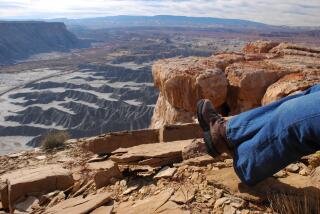Bush Calls for More Partnerships on Land Conservation
- Share via
SAND HARBOR STATE PARK, Nev. — Seeking to bolster his environmental credentials, George W. Bush on Thursday called for increased partnerships between the federal government and local stakeholders that would set a new agenda of “common-sense conservation.”
With the snowcapped Sierra Nevada looming behind him and Lake Tahoe’s chilly waters lapping nearby, the Texas governor outlined a five-point conservation plan that would cost $2.3 billion over five years and would fashion a tax incentive for landowners to sell property for conservation purposes.
It was the second major environmental speech the presumed Republican presidential nominee has given since the primaries and was by far his most comprehensive, although he did not specify how the government would pay for the program.
Bush repeatedly spoke of the need to take local concerns into consideration when deciding the future of federal lands.
“This Washington-centered mind-set breeds resentment and needless conflict,” Bush told the audience sitting before him in bright sunshine. “It’s time to build conservation partnerships between state and local government, and the federal government and local landowners.”
Bush’s message articulated a growing concern among many in the West, where the vast majority of federal land lies. Here, critics say, more and more public land is being cordoned off from the public in the name of conservation but without seeking local input.
The issue is especially acute in Nevada, where 83% of the land is federally held.
The governor was critical of the Clinton administration’s recent policy of designating huge tracts of the region’s land--much of it already in federal hands--as national monuments.
“We’ve seen millions of acres of land designated as national monuments and off limits to the public, just like that,” Bush said, drawing appreciative nods from fellow Republican Govs. Kenny Guinn of Nevada, Bill Owens of Colorado and Jim Geringer of Wyoming, who shared the stage.
The state leaders well remember what many consider a seminal event in federal land management: In 1996, with minimal local input, President Clinton set aside nearly 2 million acres in southern Utah to create the Grand Staircase-Escalante National Monument. It was the first time Clinton invoked the Antiquities Act of 1906, which allows the president to set aside land by decree. He has since named more than a dozen monument areas.
The criticism of the backdoor policy, which has been strongly advocated by Interior Secretary Bruce Babbitt, is two-pronged: the paucity of local input during the decision-making process and a concern about restricted access to the land.
Additionally, developers argue that once land moves out of the jurisdiction of the Bureau of Land Management to other federal agencies, the property rarely reverts to private hands.
With his announcements, Bush made a rare foray into the pet territory of Vice President Al Gore. Gore is perceived to have the stronger environmental policy position and this week won the endorsement of the League of Conservation Voters.
By comparison, Bush has been dogged by criticism of his conservation views and his stewardship of public land in his home state. Thursday’s event, which was open to the public, was peppered with spectators who held aloft signs calling Bush a polluter and challenging his record in Texas.
The Gore campaign on Thursday said Texas ranks 49th in funding for state parks. A Bush spokeswomen called that assertion “tortured statistics.”
Sounding for all the world like a compassionate conservationist, Bush spoke fondly of his family’s trips to state parks in Texas and waved an arm toward the vast lake behind him, calling it a national treasure.
It is a treasure whose beauty has become sorely tested by environmental degradation. In November, Sens. Dianne Feinstein (D-Calif.) and Harry Reid (R-Nev.) co-sponsored a bill that would allocate $300 million to go toward the $900 million that officials estimate would be necessary to cleanse the lake’s polluted water over 10 years. The bill has not made it through Congress, a delay Bush called a broken promise.
Bush also pledged that, as president, he would urge Congress to fully fund the Land and Water Conservation Fund, which was created 35 years ago. The fund’s coffers reached $900 million in 1978 and last year held only $500 million.
Bush’s proposals call for the abolition of the estate tax, which he said would make it easier for private landowners to pass their property to their children and create a tax break that would give a 50% tax credit on capital gains if the property is sold for conservation purposes.
His plan also calls for the establishment of the “president’s award for private stewardship,” to honor private conservation.
* BUSH GRANTS REPRIEVE
Texas Gov. George W. Bush approved his first reprieve in a death penalty case. A25
More to Read
Sign up for Essential California
The most important California stories and recommendations in your inbox every morning.
You may occasionally receive promotional content from the Los Angeles Times.











